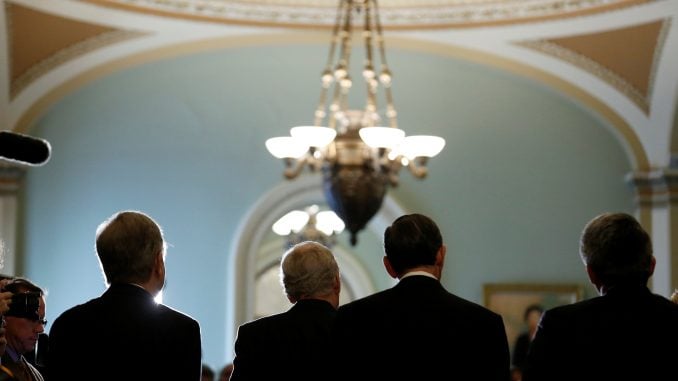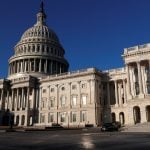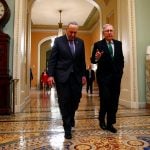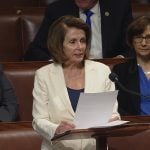
RALEIGH – The U.S. Senate and House of Representatives are expected to vote on a proposed budget deal on Thursday that would avert another government shutdown, but that has angered fiscal conservatives who complain it would lead to a $1 trillion deficit or more. Critics are calling it the nation’s biggest spending bill ever, by total dollar amount, once debt is calculated in. The deal would increase federal government spending by $300 billion over the next two years
.
The plan to keep the government operating and to increase spending over the next two years faced resistance from conservatives who favor less spending, and by liberals who say they will withhold their support as leverage to win concessions on immigration policy.
While House Speaker Paul Ryan said on Thursday morning he believed there would be enough votes to pass the budget deal in that chamber, Mark Meadows (R- N.C.), chairman of the conservative House Freedom Caucus, called the deal “eye-popping and eyebrow-raising.”
“We took an official position last night to say we can’t support this,” he told CNN on Thursday.
The deal reached by Senate leaders on Wednesday would allow for $165 billion in extra defense spending and $131 billion more for discretionary non-defense spending including health, infrastructure, $90 billion in disaster relief and efforts to tackle an opioid crisis in the country. However, it has no money for a wall among the U.S. Mexico border and no immigration deal for DACA recipients.
The deal also extends the federal government’s debt ceiling until March 2019, putting off for more than a year the risk of a debt default. The agreement, backed by President Donald Trump, disappointed conservative House Republicans and outside groups. Republicans control both chambers of Congress.
“It’s not like Republicans aren’t concerned about disaster relief, or Republicans aren’t concerned about funding community health centers or dealing with the opioid crisis,” U.S. Representative Warren Davidson, a Republican, said in an interview with National Public Radio.
“But when you add them all up, it adds to an awful lot of spending. … It’s not compassionate to bankrupt America.”
Liberal Democrats meanwhile opposed the deal because it does not include an agreement to protect from deportation a million or more illegal immigrants brought to the U.S. as minors. Many are protected under Deferred Action for Childhood Arrivals. a program enacted by then-President Obama by executive order.
In voicing her support for the DACA recipients on Wednesday, House Democratic leader Nancy Pelosi spoke on the floor of the chamber for a record eight hours, that included talking about her grandchildren and reading letters from illegal immigrants pleading to be allowed to stay in the United States.
A number of lawmakers who supported the bill acknowledged the deal was not perfect. “It’s not pretty,” Republican U.S. Representative Adam Kinzinger said on CNN.
Democratic Senator Jon Tester said he hoped House Democrats would back the measure. “We don’t want the perfect to get in the road of the good,” he told the cable network.
Here is a rundown of what is in the complex deal, according to Senate leaders:
RAISES SPENDING LEVELS
The deal would increase government spending by nearly $300 billion over two years. It would increase discretionary defense spending by $165 billion over current spending caps. It would increase non-defense domestic discretionary spending caps by $131 billion over current spendinglevels.
NON-DEFENSE SPENDING
The $131 billion increase in non-defense spending would include $20 billion for infrastructurespending and $6 billion to fund the fight against opioids and mental health crises.
CHILDREN’S HEALTH INSURANCE PROGRAM
The deal would extend funding for the Children’s Health Insurance Program (CHIP) for 10 years instead of the current six.
DEBT CEILING
The deal includes an extension of the government’s debt ceiling to March 2019. The Treasury Department has warned that without an extension in borrowing authority by Congress, the government would run out of borrowing options in the first half of next month, risking default.
TEMPORARY FUNDING MEASURE
The deal would avert a government shutdown on Thursday when the current government funding measure expires by including a short-term measure to fund the government at current levels through March 23 while appropriators write a detailed budget bill.
DISASTER ASSISTANCE
A disaster aid package of $90 billion for U.S. areas affected by events such as Hurricanes Irma, Harvey and Maria, as well as the California wildfires, will also be included.
IMMIGRATION
Immigration legislation is not included in the deal reached by Senate leaders. Senate Majority Leader Mitch McConnell has said the Senate will begin debating immigration legislation next week.
Trump has expressed support for the measure, taking to Twitter to urge its passage. White House adviser Kellyanne Conway told Fox News the agreement provides long-term certainty in the budget and funding for Trump priorities including infrastructure and military funding.
Failure to agree on spending led to a partial three-day shutdown of government agencies last month.









